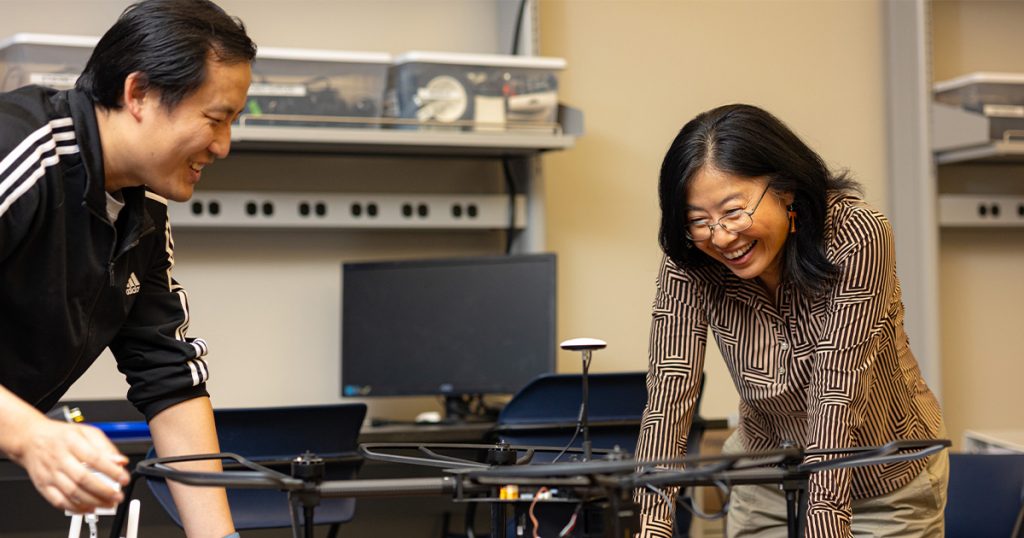Hairong Qi has been working at the University of Tennessee for 25 years, but it was only in the last five years that she started collaborating with colleagues in the Department of Psychology.
Qi, a Gonzalez Family Professor in the Min H. Kao Department of Electrical Engineering and Computer Science whose research includes image processing, computer vision, machine learning, signal processing, and sensor networks, realized how much sooner they could have been helping each other expand their research.
She expressed her feelings to Psychology Professor Daniela Corbetta.
“I told her I wish I had known her research earlier because we could have collaborated on so many more things,” Qi said. “But because of inertia or maybe bias, we usually only follow research within our own community. Only if there is a call asking for collaborations across disciplines, then we start passively looking for collaborators.”
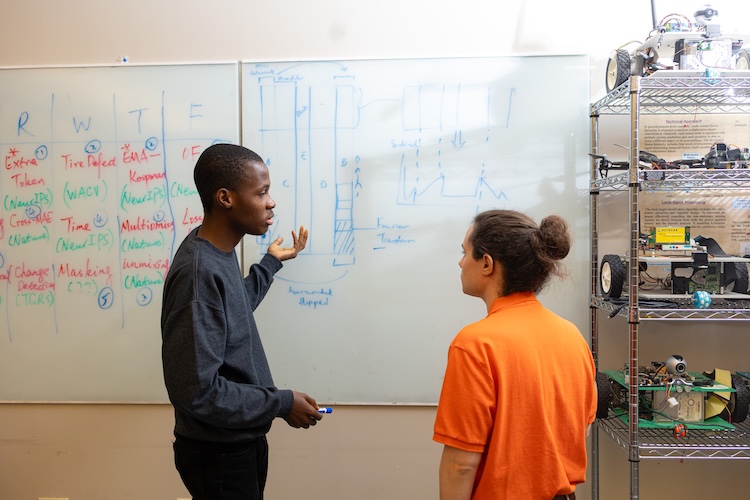
Thanks to the university’s new cluster hiring initiatives program that process will change for many faculty members. The program brings together faculty across disciplines with complementary expertise to tackle grand challenges facing Tennessee and beyond as part of the university’s land-grant mission of addressing complex problems that affect the community.
The cluster initiatives connect faculty talent to world-class research facilities and strong partnerships to accelerate UT’s research impact and prepare students for careers. UT has committed $50 million over five years to recruit top-tier faculty members across multiple disciplines to join the cluster.
The program is in the second year of a three-year hiring cycle and will soon be moving into the collaboration stage.
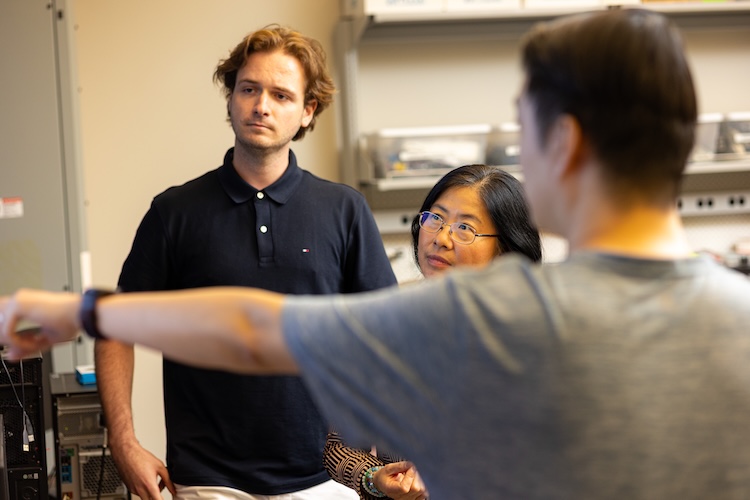
Qi is the faculty lead for the Foundational AI cluster, and a member of the Bioinformatics, Genomics, and Quantitative Solutions for Food Security Under a Changing Climate cluster, and Future Mobility cluster.
“It takes quite some time to establish collaboration with faculty in your own department, let alone with faculty across departments and across colleges. But with these clusters, you have these faculty groups that you are set up to collaborate with from Day 1,” Qi said. “That is extremely helpful for a new faculty member to have a community already set up for them when they arrive.”
Faculty-Driven Ideas
EECS is heavily involved in the program with 25 faculty members across five of the seven cluster initiatives. That’s not a surprise to Jennifer Webster, the chief of staff for the Office of Research, Innovation, and Economic Development (ORIED).
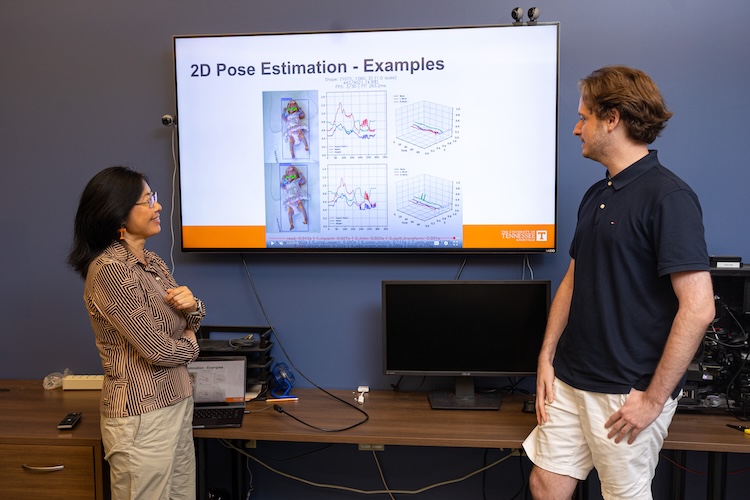
“Nationally, artificial intelligence is a huge growth area. It’s a huge priority for the federal government, for the state of Tennessee, and therefore for UT,” Webster said. “It’s important not just in terms of educating more students to be fluent in those technologies and tools, but we also need to be hiring faculty who are capable of contributing advances to the innovation economy that benefits the citizens of the state of Tennessee and the nation. That is where I think EECS has the biggest role in this initiative.”
The cluster initiative is a faculty-led program. The topics of the clusters were not decided by the chancellor or provost.
“We truly let the faculty pitch us their biggest and best ideas,” Webster said. “This is a non-traditional transdisciplinary hiring process across colleges and across departments. We are really excited about what we can achieve over time, because you are putting a community of researchers in place that cross those disciplinary boundaries, and that is where the magic happens.”
Leaders of Collaborative Innovation
EECS Professor Gregory Peterson is involved with three of the cluster initiatives. He played a large role in the initial discussions about establishing the cluster hiring initiatives while he was serving as the department head from 2018–23.
“I was working with a lot of other department heads across campus, because lots of people wanted to have computer science connections. They’re all excited about data science and machine learning and AI,” Peterson said. “That led EECS to be involved with five of the seven clusters the campus picked. That is something I really pushed a lot when I was the department head during that whole process.”
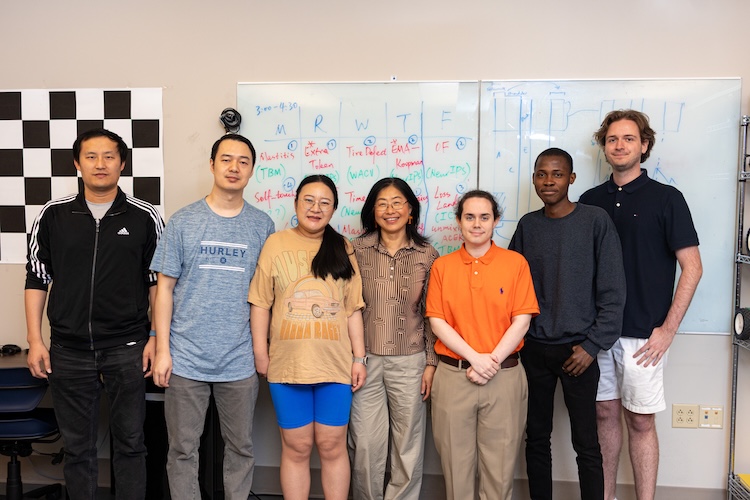
Since the launch of the program, EECS faculty members have been eager to join forces with colleagues across campus to help solve global problems through their research, teaching, and service. The collaborations have already fostered innovative ideas and opportunities that puts UT at the forefront of future research breakthroughs.
“The near-term goal is for us to go after large-scale awards from external funding agencies, which we have already started doing,” Qi said. “Now that we have the cluster faculty in place, we have started working on establishing a graduate traineeship program and trying to apply for funding for that. The fact we already have this cluster initiative in place greatly increases our chance of winning.”
EECS Faculty Involved in Cluster Initiatives
Foundational AI
- Hairong Qi (Faculty Lead)
- Fran Li
- Fei Liu
- Jian Liu
- Garrett Rose
- James Plank
- Amir Sadovnik
- Hector Santos-Villalobos
- Catherine Schuman
- Jinyuan (Stella) Sun
- Sai Swaminathan
- Dan Wilson
Future Mobility
- Kevin Bai
- Charles Cao
- Daniel Costinett
- Seddik Djouadi
- JiangBiao He
- Doowon Kim
- Hairong Qi
- Scott Ruoti
- Amir Sadovnik
- Catherine Schuman
- Himanshu Thapliyal
- Jinyuan (Stella) Sun
- Fred Wang
Precision Health and Environment
- Jens Gregor
- Jian Huang
- Hector Santos-Villalobos
- Gregory Peterson
- Jinyuan (Stella) Sun
Climate-Smart Agriculture and Forestry
- Charles Cao
- Scott Emrich
- Gregory Peterson
- Catherine Schuman
Bioinformatics, Genomics and Quantitative Solutions for Food Security Under a Changing Climate
- Greg Peterson
- Scott Emrich
- Hairong Qi
Contact
Rhiannon Potkey (865-974-0683, rpotkey@utk.edu)
